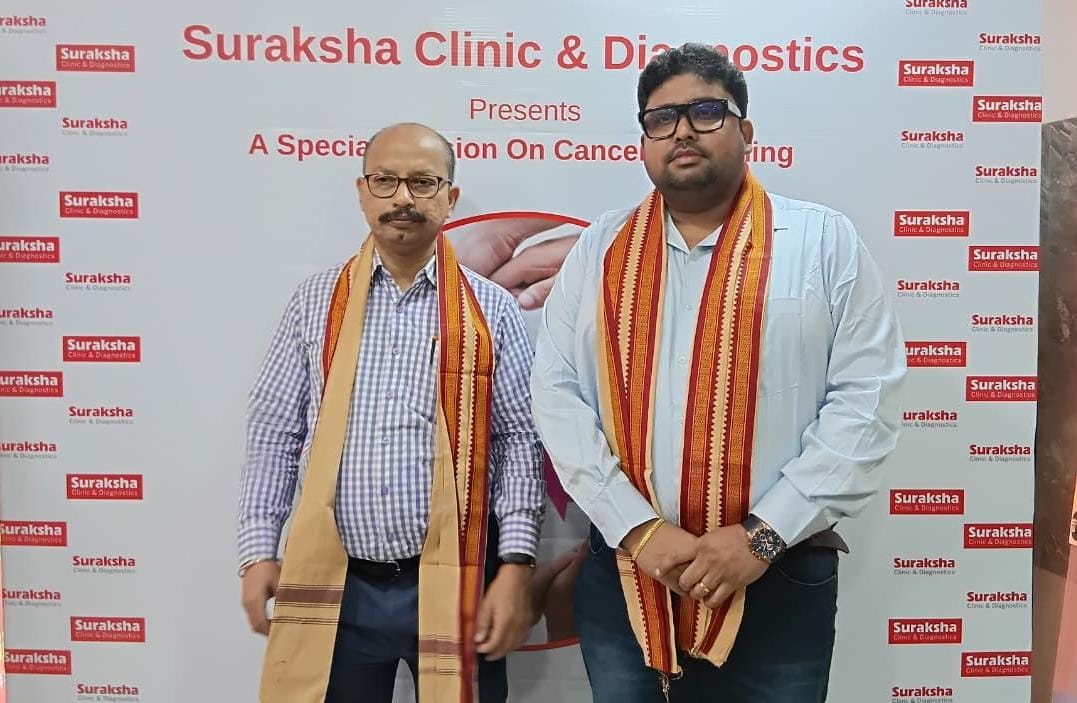
How Early Stage Detection of Cancer Significantly Improves Cancer Survival Rates…
Serampore, 23rd November, 2025: India is estimated to witness more than 1.5 million new cases of cancer by 2025, with cancer incidence rising by around 27.7% from 2015 to 2025. As per a report, every Indian is at nearly 10.6% lifetime risk of developing cancer, and early-stage cancer detection significantly improves cancer survival rates. Suraksha Diagnostic Limited (“Suraksha Clinic and Diagnostics”), one of the leading diagnostics centres in Eastern India, recently conducted a special session on Cancer screening at its Serampore centre, in the presence of Dr. Diptangshu Das – MS (Gold Medalist), FMAS, FIAGES, FGIE, F. Surgical Oncology, Consultant General, Laparoscopic and Laser Surgeon, Consultant Oncosurgeon, Dr. Barun Kumar Pal – MS (General Surgery), MCH (Neuro Surgery), Consultant Neuro & Spinal Surgery at RG Kar Medical College & Hospital, Kolkata.

In the session on Cancer screening, the experts emphasised that early detection of cancer, as well as cancer screenings in intervals, play a great role in decreasing deaths related to cancer. When cancer is detected at an early stage – prior to it growing large or spreading, treatment is usually more effective, less costly and invasive. Cancer is easier to treat at the earlier stages since early-stage tumours are smaller and localised. Once cancer spreads to other organs of the body, treatment becomes more complicated and early detection catches cancer before metastasis. Early-stage cancer detection requires less aggressive treatment methods with shorter therapy duration, fewer side effects, less risk of complications, etc.
As per a study published in the National Library of Medicine in 2020, late diagnosis of cancer was the major cause of cancer-related deaths in India. According to healthcare providers, when cancer is detected in the first stage, the chances of a cure are around 85%; however, the chances of survival are below 30% if the cancer is detected at stage 3.
According to a study, the average age of cancer incidence is significantly younger in India. In case of lung cancer, the survival rates for stage 1, II, III, and IV are around 65%, 40%, 15% and 5%. The survival rate for breast cancer patients is around 99% in case of early detection and nearly 33% in case of late-stage detection.
The most common cancer types are lung cancer in males and breast cancer in females. The doctors highlighted in the session how it is important to know the risk factors, signs and symptoms of the various types of cancers so that early stage detection and treatment becomes easier and more effective. Knowing the signs to not ignore in case of cancer becomes really important to seek immediate diagnosis and treatment. This also helps to significantly reduce treatment hassle and cost, thereby improving cancer survival rates.
Speaking on the Cancer screening session, Dr. Diptangshu Das shared: “ ‘Knowledge is power’ is the saying. Cancer Screening is that knowledge which power the best outcomes in survival. Don’t wait for symptoms. Don’t put it off. Talk to your doctor, make that appointment, and encourage your loved ones to do the same. The best time to act is now—because early detection gives you the best chance to fight, to heal, and to live.”
Sharing his thoughts on the same, Dr. Barun Kumar Pal said: “The main goal of cancer screening and early detection is to cure cancer by detecting the malignancy or its precursor lesion, at an early stage before the onset of the symptoms, at the stage when the treatment of cancer is most effective. Indeed, overall mortality has decreased than before due to this. A portion of this decrease is due to this high-quality screening, particularly in breast and colorectal cancer. The most successful cancer screening programs leads to identification of precursor lesion where treatment of this lesion leads to decrease in the incidence of invasive cancer in due time.”
Regular screening helps in the identification of cancers such as breast cancer, cervical cancer, colorectal cancer, oral cancer, and lung cancer through mammography, pap test, HPV test, colonoscopy, FIT test, visual exam, and low-dose CT for high-risk individuals.
Suraksha Clinic and Diagnostics provides cancer detection through a range of services such as advanced imaging like CT Scans and MRIs, molecular testing such as Homologous Recombination Deficiency (HRD) test for ovarian cancer and BRCA testing for breast cancer risk. They also offer biopsies, Pap smears, HPV DNA tests for cervical cancer, supported by their NABL and CAP-accredited labs.
With its advanced cancer screening programs, Suraksha Clinic and Diagnostics aims to significantly improve cancer survival rates and lead to a better quality of life.
About Suraksha Clinic and Diagnostics
Established in 1992, Suraksha Clinic and Diagnostics has grown into a prominent diagnostics provider, offering a comprehensive range of over 2,300 tests across pathology, radiology, and medical consultancy services. The company operates a central reference laboratory eight satellite laboratories, 59 diagnostic centres, and 166 sample collection centres across West Bengal, Bihar, Assam, and Meghalaya. Suraksha’s commitment to technological advancement is evident in its adoption of AI-enabled smart labs and digital platforms, streamlining operations and enhancing patient care.
Showcasing its diagnostic excellence, Suraksha Clinic and Diagnostics remains steadfast dedicated to facilitating early detection of cancer for improved patient outcomes. Suraksha Clinic and Diagnostics, also launched one of the largest and a state-of-the-art genomics labs in Eastern India with an investment of around ₹22 crores in establishing its Genomics Lab this year. An additional ₹46 crore investment is planned over the next 24 months to establish one of Asia’s most advanced Genomics Laboratories.
